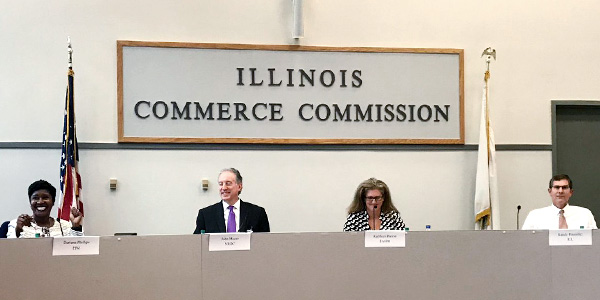By Rory D. Sweeney
Illinois regulators last week suggested PJM consider ending its capacity market if it continues supporting policies that the state believes discount its generation preferences. [Editor’s Note: An earlier version of this story incorrectly stated that regulators had threatened to leave the RTO.]
The Illinois Commerce Commission convened a Sept. 20 hearing on PJM’s capacity market three weeks before a deadline to respond to a FERC order that rejected both of the RTO’s proposals for revising its capacity market, which sparked a rush to develop alternatives. (See FERC Orders PJM Capacity Market Revamp.)
While several proposals emerged, including one supported by the Illinois Citizens Utility Board, PJM has maintained support for its own plan, which would pair an expanded minimum offer price rule (MOPR) with a two-stage auction that removes subsidized resources and reprices the results.
Already well aware of Illinois’ grievances, PJM staff attending the hearing attempted to explain the RTO’s position.
“We are really trying to make this work,” PJM’s Darlene Phillips said. “We recognize that Illinois and other states have the right to make decisions. We are not trying to fight against those decisions. We are trying to make sure that, at the end of the day, our markets work for the entire region. There are other states that aren’t making those decisions … [and their generators] don’t have the luxury of getting an out-of-market payment.”
Another Way?
PJM’s assurances didn’t sway either the ICC commissioners or the other panelists, largely made up of either environmental advocates or representatives of Exelon, which has two nuclear facilities in Illinois benefiting from a 2016 state law that subsidizes the units with state-funded zero-emission credits. The 7th U.S. Circuit Court of Appeals recently upheld the state’s right to provide the funding.
“What if we throw this capacity market out?” ICC Commissioner John Rosales asked, noting that FERC had already ruled the market unjust. “There’s some rationale we can do it another way.”
He pointed to ERCOT, which doesn’t have a capacity market.
“Is that an option? … Is there something else that we can do? Because the amount of money is uneconomical,” he said. “That’s a lot of money that’s invested in a reserve market that doesn’t seem to be needed most of the periods throughout the year,” Rosales continued. “Understand, there’s times that we’re going to need some help, but you get that [help] from others.”
Jen Tribulski, a PJM attorney, suggested that FERC didn’t intend to do away with PJM’s “capacity market as a whole,” but sought to improve how the market deals with out-of-market payments.
The disagreement came over what is considered a subsidy. Phillips said that “we have to draw a line somewhere. This is not easy.”
However, opponents argued PJM has larger market distortions to address.
“Regulated utilities have the ability to subsidize all of their generation with ratepayer funding, so if you’re going to talk about a market without subsidies, you’ve got to really relook at the whole market. It’s the single biggest market distortion that there is,” said Rob Kelter of the Environmental Law & Policy Center. “When you consider the cost of energy and you don’t consider the cost of environmental externalities, you are creating the biggest distortion you could possibly create. Coal and natural gas pollute.”
“Right now, the proposal on the table is to artificially raise the prices that consumers would be paying to preserve the supremacy of the capacity market,” said Andrew Barbeau of The Accelerate Group. “There’s a certain fealty to the capacity market that we’ve seen in recent years … to use the capacity market to start serving other purposes. It’s always been there to serve as this insurance product. Consumers are paying more and we’re getting less for it, and it’s kind of violating what residents of the state have been pretty consistently demanding, which is that the power be cheaper and cleaner.”
‘Fundamental Disconnect’
Phillips said the market “is doing what it was meant to do when it was put in place” to produce “reliability at the least cost,” but that it didn’t contemplate environmental concerns. She added that she was “not saying there’s not room for improvement.”
“That’s something that states can get together and have a discussion about” in creating a market-based proposal, she said. “You’re getting reliability. You’re getting assurances, not insurance, [but] assurances that three years from our market, three years forward, that we have enough capacity online to make sure the energy needs during that period are met.”
ICC Chairman Brien Sheahan said there is a “fundamental disconnect in PJM’s conception of what ‘accommodate’ is and what ‘mitigate’ is.”
PJM says its proposal accommodates states’ policy decisions, but states argue it instead mitigates their efforts to sponsor preferred technologies.
“You can’t just start doing this kind of line drawing,” he said. “And the end result, I predict, will be if they don’t accommodate, then the states are going to find alternatives. … Legislatures and governors in states that care about climate change and care about environmental policy are not going to bow to how [PJM thinks] they should work.”
ICC Manager Randy Rismiller suggested moving away from capacity markets altogether.
“Energy and ancillary services markets historically have worked quite well. They haven’t been as contentious as capacity markets. This sort of gradual gravitation away from capacity might be a way out of these constant conundrums,” he said.
CUB’s Kristin Munsch urged PJM to “stop trying to separate us, but integrate our preferences into the market.”
“I think PJM in recent years has begun to adjust the construct, a market that we thought was working well, to one that’s no longer reflecting what I think consumers are looking for,” she said.





